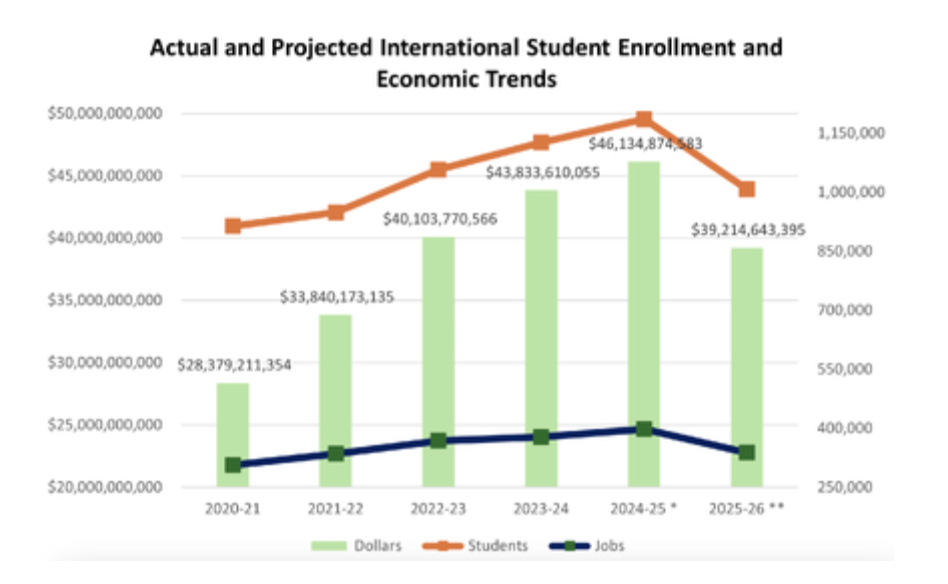US Economy Could Suffer a $7 Billion Loss from Precipitous Drop in International Students
NAFSA released new data this week showing the potential economic impacts from the anticipated loss of international students. We are all familiar with their economic value tool; this data actually represents potential loss. It’s important to note NAFSA’s data provides analysis of the economic contributions of international students and their families to the US economy. In this analysis, they take a look at the actual impact from the loss of international students and what that means for communities and states across the country.
“This analysis, the first to calculate the potential economic impact of fewer international students on cities and towns across the country, should serve as a clarion call to the State Department that it must act to ensure international students and scholars are able to arrive on U.S. campuses this fall,” said Fanta Aw, executive director and CEO of NAFSA: Association of International Educators.
“The immediate economic losses projected here are just the tip of the iceberg. International students drive innovation, advance America’s global competitiveness, and create research and academic opportunities in our local colleges that will benefit our country for generations. For the United States to succeed in the global economy, we must keep our doors open to students from around the world.”

Another Tool - Shorelight’s Tuition Analysis
The research NAFSA provided helps in pulling all of the economic pieces together. As a reminder, Shorelight’s Analytics Team created a dashboard to further assess the impact of such a decline at a state and congressional district level. Our focus is strictly on tuition dollars. We also recognize international students offer value beyond tuition: They add to the community, bringing diversity, innovation, and more. They contribute to the economy at large and support hundreds of thousands of jobs, as we know from NAFSA’s broader Economic Value Data Tool.
Major Changes to US Visa Interview Waiver (Dropbox) Program Starting September 2, 2025: What You Need to Know
On Friday, July 25th, the U.S. State Department announced a major shift in policy impacting Visa Interview Waivers. Under previous rules, students who held a valid visa within the previous 12 months could apply for an interview waiver. Unfortunately, as part of the administration’s restrictive visa policies, they have removed eligibility for most applicants.
In February 2025, the State Department had already narrowed the interview waiver program by limiting it to renewals in the same visa category within 12 months of expiration, and by eliminating eligibility for first-time applicants. The upcoming September changes go even further, effectively ending dropbox eligibility for most nonimmigrant visa categories, regardless of prior visa history.
Under the new rules, the vast majority of visa applicants — including those applying for H-1B, H-4, L-1, L-2, F-1, F-2, M-1, and J-1 visas — must now attend in-person interviews at a U.S. consulate abroad. Previous age-based exemptions that allowed children under 14 and applicants over 79 to skip interviews will also no longer apply. These changes reverse long-standing policies and will dramatically reduce the number of applicants eligible to bypass interviews.
Learn more from immigration attorneys at Reddy, Newman, Brown PC >
Is America Ready to Lose OPT? The Silent Engine Behind US Tech Could Stall
Unfortunately, all in our sector know that OPT is in the administration’s crosshairs. Beyond the threat of this bill that calls for the elimination of OPT, there are others in the administration who also want to eliminate OPT; the new USCIS Director Joe Edlow is one such official. The article below contains useful information on potential impacts, including statistics. It is important to remember that the consequences are bigger than just international students, America’s future would suffer if we were to eliminate OPT. The question goes back to Shorelight’s News & Insights article this week: Justifying Change: Is it Based on Facts or Ideology?
Critics, such as Jessica Vaughan of the Center for Immigration Studies and USCIS Director Joseph B. Edlow, argue that OPT functions as a “shadow guestworker programme” that undermines American graduates. Edlow testified to Congress that he intends to “remove the ability for employment authorizations for F-1 students beyond the time that they are in school.”
But behind these arguments lies a deeper irony: without OPT, it’s not Indian students who suffer most — it’s America’s own innovation engine.

